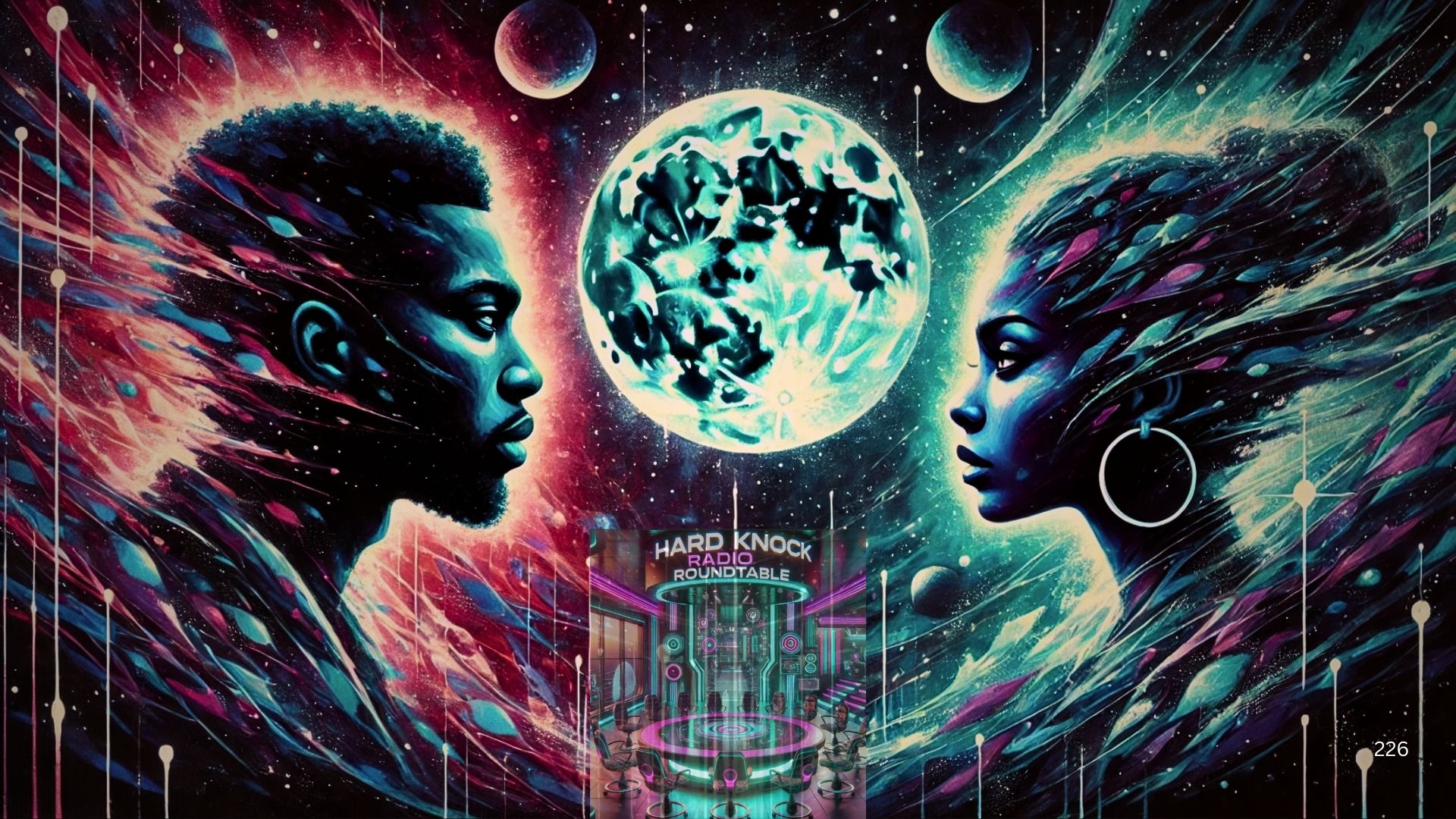As 2024 draws to a close, Hard Knock Radio hosts a powerful conversation that delves deep into the intersection of Black culture, resistance, and speculative futures—Afrofuturism. The discussion includes insights from a diverse panel of guests: journalist Jenee Darden, artist and educator Ras Ceylon, and scholar/artist Kwadwo Deterville, with host Davey D leading the way.
What is Afrofuturism?
Afrofuturism is a cultural and artistic movement that combines science fiction, technology, and Black identity. It envisions futures where Black people and cultures thrive, often by reimagining history and challenging dominant narratives. In this Hard Knock Radio conversation, the panel reflects on the past year of Afrofuturism, unpacking how speculative fiction, sci-fi, and superhero media represent Black people and envision the future.
Dystopia or Hope?
The conversation explored recurring dystopian themes in popular media. Host Davey D noted the rise of authoritarian politics. Communities are being erased, and histories rewritten. But there is resistance. Kwadwo Deterville highlights Afrofuturism. He says exploring Afro-dystopia helps Black communities imagine new survival methods.
The State of Sci-Fi and Representation
The panelists reflect on their experiences with pop culture and Afrofuturism over the past year. Jenee Darden highlights her attendance at Fan Expo in San Francisco, where she engaged with Afrofuturism at a larger scale. She notes the increasing visibility of Black characters in media, but also expresses concern over mainstream media’s potential retreat from diversity.
Davey D explained that after George Floyd’s death, media shifted toward “family-friendly” content. This often sidelines diverse narratives, favoring white-centric stories. Despite positive reception, series like The Marvels and Star Trek Discovery were canceled.
Ras Ceylon and Kwadwo Deterville both reflect on how Black creativity continues to thrive despite these challenges. Ras, for example, points out how the X-Men 97 series drew powerful parallels to real-world geopolitical issues, including the genocide of Palestinians. Furthermore, it celebrated the resilience of oppressed peoples. Meanwhile, Deterville also mentioned Supercell, a powerful Netflix series about Black people with superpowers. He feels biases in the tech and entertainment industries prevented it from receiving the attention it deserved.
Imagination as Resistance
Throughout the discussion, the panelists return to the theme of imagination as resistance. They highlight how Black people, even in the harshest conditions, have consistently used creativity to build and innovate. From the origins of Hip-Hop to the reimagining of space in Afrofuturism, there is a constant thread of using imagination to overcome systemic oppression.
Kwadwo Deterville discussed attacks on the radical Black imagination. He emphasized the need to nurture it today. He highlighted the importance of reclaiming spaces and narratives. He compared Black artists in Detroit’s techno scene to contemporary Afrofuturist creators.
AI and Technology: Tools for Liberation?
Artificial intelligence, with its biases and implications, is also part of the conversation. As technologies like ChatGPT become more ubiquitous, there are concerns about its impact on creativity and imagination. Jenee Darden raised concerns about AI scraping artists’ work without compensation, while Ras Ceylon acknowledged that AI is a tool that can either liberate or oppress, depending on its application.
Kwadwo Deterville emphasized that AI is framed as objective but rooted in Eurocentric, white-dominated narratives. He calls for an “African Intelligence.” Black people should create their own technological and intellectual frameworks to counteract Western biases.
What’s Next for Afrofuturism?
Looking ahead, the panelists are cautiously optimistic. While challenges persist—especially in the realms of media representation and systemic oppression—there’s a strong sense of cultural resilience. As Jenee Darden notes, “We’ve always built from nothing. We’ve always figured out a way to thrive.”
Ras Ceylon also shares exciting news about his return to Sri Lanka in 2025, after his music was banned there by the previous government. This triumphant return symbolizes the power of creativity and imagination even in the face of systemic censorship.
Conclusion: Resilience and Resistance
As 2024 wraps up, Hard Knock Radio discusses Afrofuturism, science fiction, and resistance. Black people create new worlds through music, art, and speculative fiction. Their commitment to survival and liberation remains strong. From films to grassroots movements, Afrofuturism is more than a genre. It’s a tool for social change and a vision of a better, more inclusive future.
This year in review shows Afrofuturism’s continued relevance as a cultural force. Black communities thrive through creativity and imagination. Check out Jenee Darden’s recommended readings. Ras Ceylon’s upcoming project in Sri Lanka inspires. Kwadwo Deterville shares his thoughts on analog technology. The year ahead promises more artistic innovation and cultural resistance that will continue to shape our world.
Hard Knock Radio is a drive-time Hip-Hop talk show on KPFA (94.1fm @ 4-5 pm Monday-Friday), a community radio station without corporate underwriting, hosted by Davey D and Anita Johnson.


Leave a Reply